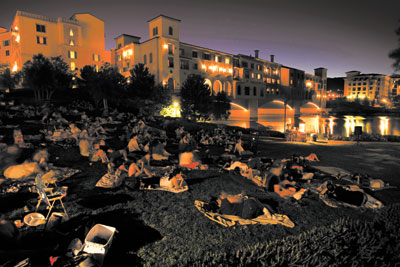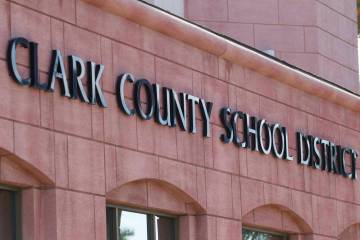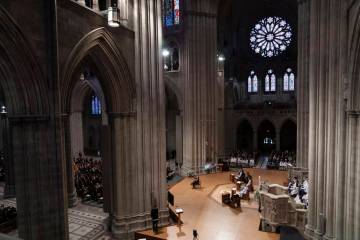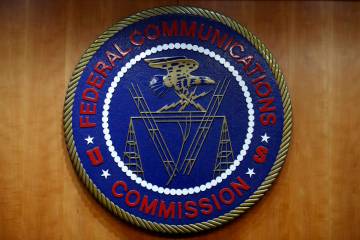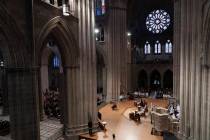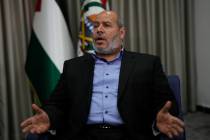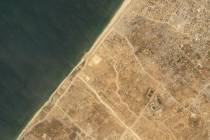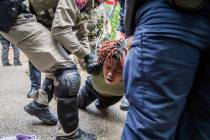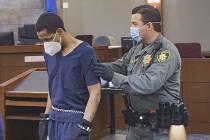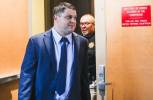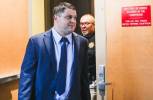Bankrupt project still alive
So what does one of the largest bankruptcies in Nevada history look like from street level?
After two weeks, it's hard to tell.
Lake Las Vegas shows no outward signs of the financial trouble that prompted five companies connected with the master-planned community to file for Chapter 11 bankruptcy protection on July 17.
Thursday morning, the lakefront development swarmed with maintenance workers, who busily cut the grass, raked up leaves and hunkered over leaky valve boxes.
Residents came and went through the gates of their gated communities. The tortoise sculptures in front of Loews Lake Las Vegas resort spat water.
UNLV law professor Nancy Rapoport isn't surprised.
Lake Las Vegas has one mission right now, she said: "Try to preserve the going-concern value" of the development.
For one thing, the property is worth a lot more if it's open, operating and in one piece.
"Ideally, you want to see if there's someone else who wants to come in and take it over," said Rapoport, who teaches bankruptcy law at UNLV's Boyd School of Law.
On Monday, a Las Vegas bankruptcy judge will hold a hearing to determine whether Lake Las Vegas should be allowed to borrow $127 million from a Wall Street investment banking firm.
Company officials say they need the money to pay for repairs to the 2-mile-long man-made lake and maintain payroll, employee benefits and day-to-day operations. The company employs 260 workers, mostly for its golf courses.
Rapoport said this bankruptcy "might well be" the largest Nevada has ever seen.
Already it's large enough to prompt wild speculation about the city of Henderson getting dragged into bankruptcy, too. But city officials literally laugh that off.
"Are you kidding?" Henderson City Attorney Shauna Hughes said. "There is absolutely no connection between the financial condition of Lake Las Vegas and the excellent financial condition of the city of Henderson."
Hughes is scheduled to testify at Monday's bankruptcy hearing. She said city officials have "every confidence" that Lake Las Vegas will be allowed to borrow the money to make repairs and keep operating.
Even those with reason to worry aren't too concerned.
UNLV President David Ashley paid $1.35 million in October for a 4,125-square-footer that backs up to the 13th hole of the Reflection Bay golf course.
He said the bankruptcy doesn't really bother him. Though it could stall further development in the community, he doesn't expect to see major changes to what is there.
Ashley said his homeowner's association sent a letter assured him that the bankruptcy would not have an impact on services or drive up fees.
If Ashley has any regrets, it's that he bought a house before the overall real estate market finished its current slide.
From what he's seen so far, though, homes in Lake Las Vegas seem to be holding their value better than some places.
"If you were going to buy anywhere in October, that was as good a place as any."
The people Ashley worries about are his neighbors. They had their house up for sale when news of the bankruptcy broke, he said. "The market is hard enough right now for people trying to sell a house."
Ashley said he knew before he bought his home that Lake Las Vegas was under some "financial stress," though he was not expecting a bankruptcy.
Even so, his feelings about the community's "long-term value" have not changed. "I'm not in any way swayed to think about leaving. I'm absolutely committed to staying."
Rapoport said homeowners might have nothing to worry about. Or maybe nothing additional to worry about beyond the nosedive the housing market was already taking.
"It's not a given that their homes are going to go down in value with the Chapter 11 filing," Rapoport said. "Frankly, it will depend on the homeowners and their neighbors."
If people stay put and take care of their homes, the bankruptcy could pass with no effect. If they panic and put their houses up for sale at once, values will decline, she said. "Clearly, a going concern is better for them than a fire sale."
Hughes hasn't heard from any worried homeowners yet. She suspects some people living at Lake Las Vegas are reacting to the bankruptcy with "a feeling of relief." They don't see it as the end of the project, but as a way for it to move forward, she said.
It looked like business as usual Thursday morning at Lake Las Vegas. Golfers golfed. Mowers mowed. Waterfalls fell.
But it wasn't exactly busy.
At 10 a.m., a single player had the tables to himself at Casino MonteLago. The nine other people in the 40,000-square-foot casino confined themselves to the slots.
On the XM satellite radio station piped into the casino, Don Henley began to sing:
Empty lake,
Empty streets
The sun goes down alone.
Outside, MonteLago Village was a ghost town of boutiques, coffee shops and high-end eateries.
Most of the shops were gamely open anyway, though a few of them had temporarily locked their doors and posted clock-shaped signs that said "back at noon."
"You've got the village all to yourself this morning," said one store clerk by way of a greeting.
Weekdays in the summer tend to be slow, the woman said, but things would pick up that night and through the weekend.
She said Lake Las Vegas is busiest in late winter, when people come to Southern Nevada to escape the cold weather back home.
"The economy is messing things up all over right now," the clerk said.
This is Henderson's second major bankruptcy in two months.
City Crossing, a $2 billion mixed-use development at St. Rose Parkway and Executive Airport Drive, filed Chapter 11 in early June.
The key difference: That 126-acre project had yet to advance past the initial site work.
The 3,592-acre Lake Las Vegas development has been around for close to 20 years, and people have been living there for the past 12 years.
And Henderson officials have been on board from the very start.
The city's stance on the project was something akin to unfettered glee, and no wonder. An analysis at the time predicted a $16 million boost in revenue for Henderson as a result of the project. That would have roughly doubled the general fund in a city of 50,000 eager to shake its industrial roots.
A lot has changed since then.
Henderson is now Nevada's second largest city, with a population of more than 260,000 and a general fund budget of almost $238 million. No single project, regardless of how audacious, can make or break the city anymore.
But in the late 1980s, as the developers of Lake Las Vegas fought to win the reluctant approval of various federal, state and local agencies, they were frequently joined at the podium by Henderson officials.
Hughes herself testified on the project's behalf in 1989 when developers were seeking final approval from the Clark County Regional Flood Control District.
"We have been really supportive of this project from the very beginning," said Hughes, who has served as city attorney since 1983.
But Henderson has also been very careful, she said, as evidenced by the "two dozen or so" separate agreements the city has made with the developers over the years.
Under one of those agreements, the city is obligated to keep $30 million on reserve for another 11 years to pay for any stormwater improvements or cleanup that environmental regulators might order in connection with the lake.
When the 30-year agreement runs out in 2019, the city is free to use the $30 million, or whatever is left of it, on something else.
Henderson's only other direct financial link to Lake Las Vegas is a trio of local improvement districts that were set up to ease the construction of roads, utility lines and other public infrastructure there.
It works like this: The developer builds the infrastructure and the city sells bonds to pay for it. The bonds are then paid off gradually over a decade or two, as the developer collects money from people who move into the community.
At the moment, Lake Las Vegas is delinquent on more than $2.2 million in improvement district payments to the city. The combined payoff amount for bonds associated with the three districts is about $33.1 million.
Ultimately, though, the bonds are secured against property at Lake Las Vegas, Hughes said. "The city is never on the hook for a dime."
A public relations firm representing Lake Las Vegas did not respond to the Review-Journal's request for comment.
It's unclear how long the development's Chapter 11 reorganization might last, but Rapoport is hoping it is still under way when she teaches her next bankruptcy law class in the spring.
"How often do you get a big case in your own backyard for your students to follow?" she asked. "It's delightful."
The last time something like this happened to her, Rapoport was working as dean of the law school at the University of Houston right when Enron went bust.
Rapoport hasn't gotten around to visiting Lake Las Vegas yet, but she plans to go there soon.
"I teach bankruptcy law, so I try to patronize businesses that are in Chapter 11. You try to give them the benefit of the doubt."
Then Rapoport said something that Lake Las Vegas and its creditors should absolutely love: "People shouldn't see this as a reason to stay away."
Contact reporter Henry Brean at hbrean@reviewjournal.com or 702-383-0350.



